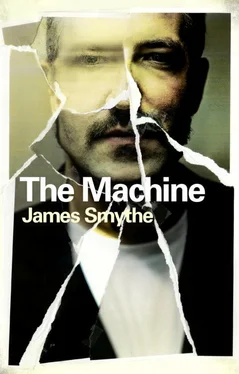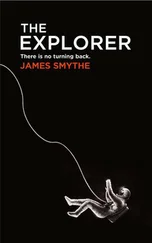Now, somehow, Vic stands below her, on the Grasslands.
You can jump now, he says. Drop, bend your knees. Take the fall, don’t let it take you.
Okay, Beth says. She lets go. This is a trust exercise, like they made them do in therapy. How much do you trust your partner? Will they catch you if you fall? Beth goes down on her ankle, on the hard lawn – nothing to take the pressure, nothing spongy underneath to make this easier – and she falls to her side. She lies there for a second: the echo of the ram – she assumes – against her front door, coming through the whole estate, bouncing off the walls.
You have to run, he says.
I know. Her ankle is sore but workable, and she gets going, along to the cliff edge, and from there to the outskirts of the estate. The greyness of the place is overwhelming from here: the hidden part: the stuff behind the cooker or underneath the fridge. Graffiti lines the walls of people’s flats – FUCK TENBEIGH, one says, about the Prime Minister, and WHO LIVES HERE IS A CUNT reads another, and TITS is a third, with breasts drawn below it; and Beth knows that this last one was made by the boy, and she wonders when, because it looks old and faded and somehow part of the concrete, so she wonders how young he was when he actually did it – and there’s rubbish, like manmade scree, piled up against the building, trainers and food packets and empty tins, all browned from the sun, all rotting and cooking under the heat. Then she sees the body of a cat: dead, partly eaten, flies swirling. She can’t smell it. It’s been here too long now, almost a fossil.
When she reaches the front of the estate, cutting along the cliff-side path towards the strip of shops, she sees it from the bottom of the hill. There’s a crowd of people outside her flat, and all along the balcony. All with their arms raised, all watching Laura, who shouts things that Beth can no longer hear. She doesn’t suppose that the words matter now: this is just to incite them, to get them baying for blood, and they’re all transposing something else onto this. Nobody cared about the boy, because if they did they wouldn’t have allowed him to become who he was, and yet they find it easy to make Beth a villain suddenly, and everything – the place, the heat, the sense that her life as she knows it is all ending so soon – can be blamed on her. She doesn’t know what they would do if they caught her, but their arms are raised in fists, and they shout things at each other. Beth watches as Laura seems to command them, and they go into the flat past the police, and they reappear within seconds in groups of three, dragging the Machine out.
We have to go, Vic says.
Wait a minute, Beth tells him. She watches them bring it out in its three pieces, somehow separated – she had forgotten that that was how it arrived, less than whole, and that she made it what it was, physically, if nothing else – and they bring each piece to the edge of the balcony. They know what it is and what it does, because they were everywhere: the lives that they destroyed. The tabloid campaigns to ban them: OUR SOLDIERS, RUINED FOR THEIR COUNTRIES, they howled. And when the dementia patients and the Alzheimer’s patients and the amnesia patients began to be affected, that was it. Everybody hates the Machine. They throw the pieces over the balcony and they shatter on the floor below, held together by bolts that aren’t meant to take impact, and the black metal sheets flay off as the structure comes apart. Piece two follows, colliding with piece one, and then the final piece, the centre, with the screen and the lack of guts. All three lie crumpled, and they watch them. The people on the balcony – policemen, locals, the boy’s gang, Laura – all see the figures at the end of the road. They roar.
Beth turns and runs to the edge of suicide point.
I can’t let them get you, she says to Vic.
Then run.
I will, she says, but first. She pulls the pebble of the hard drive from her pocket and gives it to him. Go on, she says. He pulls his pose, his Adonis pose, his body-builder weightlifter idealized pose that she never saw him pull in real life, and his arm curls backwards and then releases, spring-loaded. The hard drive flies out and through the air, towards the water. It doesn’t skim; it smacks into the gentlest wave and it’s gone. No glint as it sinks.
Now what? Vic asks. She strips her clothes off. Down to her underwear. You might not make it, he says. There are rocks, and then the swim.
I can do the swim, she says.
The rocks, then.
Maybe, she says. She doesn’t wait for him: she throws her arms upwards and bends her knees slightly, and then flings herself forward and out. She opens her eyes, because if she’s going to hit the rocks she wants to know: but all she can see is Vic already in the water; already, that body cutting through the waves, his arms making a wake of their own, and she knows as she hits the water and it shocks her and he’s suddenly gone, that she’ll be swimming behind him the entire way.
She rushes up the lawn, because she doesn’t know if they’re here. She doesn’t have a clue if they’ll be watching this place or not. It depends on where they think she is. They might not even know that she made it off the island; this might give it away. Doesn’t matter, she thinks. So little time to go. So she runs across the lawn, patting her clothes down, and she smiles at the lady at the front desk, who smiles back. She doesn’t know if she recognizes her, and that’s fine, or if she just notices the burn marks on her head, so visible now. Vic comes just behind her, and the woman doesn’t bat an eyelid at that, but Beth doesn’t expect her to. She’s used to this now.
She follows the sand-coloured line, even though she knows the way, but she’s always followed it, like a habit. She doesn’t wait in the doorway because she doesn’t know how long she’s got.
Hello, she says to Vic, lying on his bed. He doesn’t answer, because he can’t. She can’t remember what happened the last time she was here. She was going to come and get him, and something changed. She wishes that she could remember what that was. How far she got, even: if she stood here and helped him dress and then chickened out, because it would be too much. And would it even work? And did she want it to? She puts her hand on his leg, which is thin and weak and soft. I’ve come back for you, she says. The other Vic – the one that she’s brought with her, who is somehow a part of her and nothing else – doesn’t say anything. He stands by the door and watches her, and he looks at her from underneath his eyebrows, tilted forward.
Are you okay? she asks them both. Neither can answer her, so she carries on. I love you, she says. That’s why I did this. That’s the only answer, isn’t it? And would you want this? She sits on the edge of the bed.
They said to her, when it happened, that there was nothing left of him inside. This isn’t your husband, they told her. This is a body. And it’s alive, and it’s learning, but it’s nothing like him, and it’s nothing to do with him. You asked us why so many people find it easy to divorce their loved ones when this happens. That’s why. There’s nothing of him left any more.
So, she says to Vic, I don’t know where to go from here. But I have an idea. She squeezes the body’s hand. I really do love you, she says. She kisses him on the forehead, even as his head moves of its own accord, left to right, and her lips smear on it. Okay, she says. So I should go. I’ll see you soon.
She gets out of the room and doesn’t follow the sand-coloured line back to the entrance. Instead she follows the black line. It takes her up another flight of stairs, and down a corridor, and then to another flight behind a door, and she expects this to be locked but it isn’t, because who is going to break in to get to this? It gets warmer as she climbs: no air conditioning up here, and the warm air from below seeps up through the building’s floorboards, and by the time she’s at the top of the last staircase she’s almost broken into a sweat and she’s breathing heavily through both her mouth and nose.
Читать дальше
Конец ознакомительного отрывка
Купить книгу










